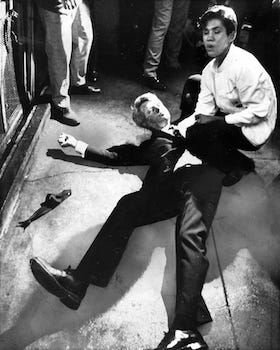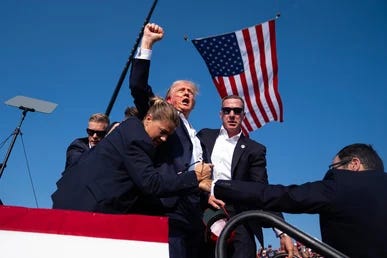Recency Bias and the "Forgotten" History of Western Political Violence
Today’s fears of political violence are amplified by recency bias, but the West has faced — and survived — similar, if not worse, challenges in the not-so-distant past.
The murder of the conservative political activist Charlie Kirk by, almost certainly, a leftist killer has once again brought to the headlines the topic of political violence in the US and the Western world more broadly. Now, there is no question whatsoever about this murder being an awful affair and that politically motivated violence is an alarming trend. What I nevertheless noticed is that the current debate in online spaces regarding these negative developments suffers from what I would call a very serious case of recency bias.
Recency bias is a cognitive bias that favors recent events over historical ones. A type of memory bias, recency bias gives "greater importance to the most recent event." Now, this is a completely natural phenomenon that, to a large extent, cannot be completely avoided. We understandably perceive events occurring right now with more urgency than historical events that we either have not lived through or that have been ameliorated in their seriousness by being relatively distant memories.
I think the internet and social media play a major role in massively reinforcing the power of recency bias. We are exposed to a constant flow of information and opinions about current events, and due to the combination of the algorithm-driven age of competition for our attention with the natural inclination of human nature to be drawn more strongly towards negative information, there is a rather powerful incentive on the part of the people in the broad “information industry” (that now includes thousands of social media accounts or YouTube channels based on constant commentary on recent affairs) to portray reality in a rather bombastic, catastrophic manner. Everything is diabolical, unheard of, worse than it has ever been, heading towards collapse or some inevitable climax of truly historical proportions.
Now, I do not want to absolve myself of responsibility for engaging in precisely what I am describing here. My YouTube endeavors have taught me that a properly catastrophic title for a video is a fundamental necessity for getting a reasonable amount of views. Someone must be going extinct, there must be collapse, dystopia, conflict, mayhem. Nuance can then be present in the video itself, but the title must slap. To my defense, you just would not click on it otherwise!
It is a question of who manipulates whom here—whether the content creators manipulate the viewers, or the viewers, with their demand for catastrophe, manipulate the content creators. It is a symbiotic relationship. And of course, before you watch the video about your ethnic group going extinct, your economy collapsing under the weight of aging and possibly also brewing ethnic conflict, consider using my discount code for this VPN product, since you're definitely going to need to watch some foreign TV show on Netflix not available in your country to relax a bit while the world crumbles around you.
What can I say, that is just how this whole thing operates. That is also why I really enjoy Substack, since when I know I am writing for people who really want to read it, I can drop most of the bombastic necessities of YouTube, where one constantly wants to draw the attention of new viewers.
But the reality is that political violence is by no means unheard of in the post-World War II context of the Western world, and it has often reached rather spectacular proportions. I will limit this listing to the post–World War II period since the level of political violence before that was so high, common, and routine that one would have to list hundreds of events here—but also because I feel World War II creates a significant mental barrier in our ability to relate to our forebears. We perceive people before the war to be more distant from us than those after the war.
Last year, President Trump very narrowly escaped death when a bullet hit him in the ear, creating this very iconic badass photograph:
But of course, shooting at presidents is somewhat of an American tradition. John F. Kennedy was shot in 1963 in what is probably the most famous presidential assassination in modern history. His brother, Robert F. Kennedy, was assassinated by a pro-Palestinian, anti-Zionist (some political issues just can’t go away, can they?) Arab man, Sirhan Sirhan, in 1968, while being the Democratic nominee in the '68 presidential elections.
Keep reading with a 7-day free trial
Subscribe to Kaiser Bauch to keep reading this post and get 7 days of free access to the full post archives.



